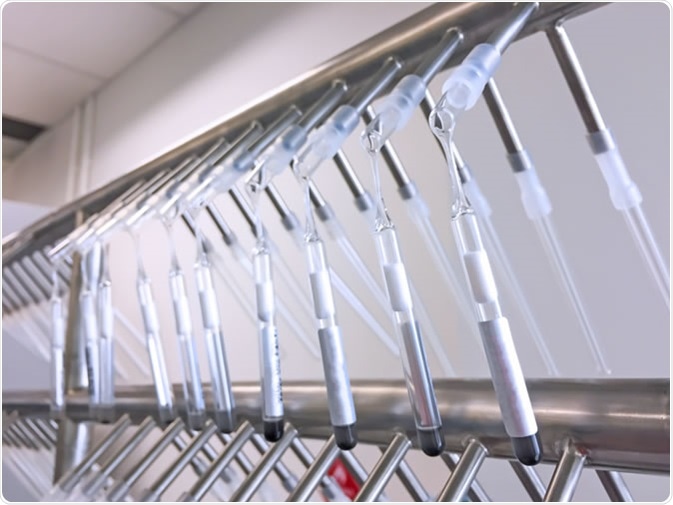Skip to:
The pharmaceutical industry relies on accurate information about structures that can be targeted for research. To effectively study a sample or organism being prepared for analysis, it is useful to retain the integrity of a structure or organism. The industry also requires drugs that are easy to store and transport without being degraded and have a good shelf-life. One method that is especially suited to these needs is lyophilization.

Preservation of microorganisms by lyophilization or freeze-drying. Image Credit: Kallayanee Naloka / Shutterstock
What is Lyophilization?
Lyophilization involves freezing a substance and then removing any ice or solvent through sublimation, which turns it into vapor without passing through a liquid stage. This requires specialist equipment. There are three stages to the process:
- FREEZE – The sample is completely frozen, typically in a glass vial or flask.
- VACUUM - This requires a deep vacuum which is significantly below the triple point of water (the lowest point where liquid, gas and solid forms of the material can coexist).
- DRYING – Energy in the form of heat is added, which causes sublimation.
Compared to other methods of product preparation, controlled lyophilization keeps the product at a low enough temperature to avoid changes in the characteristics and appearance of the dried product. This makes it a good method for the preservation of many different heat-sensitive materials. These include microbes, proteins, pharmaceuticals, plasma, and tissues.
Uses in the Pharmaceutical Industry
Lyophilization has been used in many different research projects in the pharmaceutical industry. As has been mentioned, the process provides excellent retention of the three-dimensional structures of biological samples, which aids in the accuracy of drug developmental research.
Allowing the drying of heat-sensitive drugs and biologicals at low temperature, it is mainly used to improve the stability and storage of labile drugs. Commonly applied to the production of injectable dosage forms of drugs, pharmaceutical freeze-drying is also used to produce diagnostics. Less commonly, it is used to produce solid oral dosage forms that require a very fast dissolution rate.
By removing water/solvent and sealing the product in a vial, the shelf-life of injectables and vaccines can be increased. Therefore, pharmaceutical companies can easily store, ship, and later reconstitute the material to its original form for injection.
Lyophilization can also be used as a purification process in the later stages of sample preparation, due to how effective this process is in removing solvent from a product.
The technique does have some limitations though, and not all research techniques can benefit from samples prepared in this way. For example, X-ray crystallographic studies require a pure crystal, and samples that have been freeze-dried (the sample must be dialyzed to remove buffers and salts that are still present that may cause undesirable effects on the crystal) are not suitable for this. Even though some proteins such as catalase are known to crystallize after lyophilization, the process is generally not suited to crystallographic studies. However, lyophilization remains one of the most reliable and widely used techniques for sample preparation in the pharmaceutical industry.
The Future for Lyophilization
Lyophilization is an incredibly practical solution for the issues that research, production and storage which the pharmaceutical industry faces. Like any technique, however, it is not without its problems, which means that the process is always being refined. It remains one of the best-placed drying methods that is used in the pharmaceutical industry, and will do so for many years to come.
Product Lyophilization Process
Further Reading
Last Updated: Aug 21, 2023